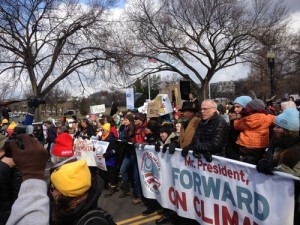“The ocean levels are rising, the icecap is melting, severe storms are more intense and more frequent; Climate change is real. Not that you’d know it in this body.”
— United States Representative Peter Welch (D-VT)
Floor Statement of Rep. Peter Welch
*Safe Climate Caucus
March 20, 2013

Rep. Peter Welch.
Mr. Speaker, the ocean levels are rising, the icecap is melting, severe storms are more intense and more frequent; Climate change is real. Not that you’d know it in this body.
We’re still having a debate about the reality. This is a fact-free zone in Congress when it comes to climate change. But we can still make progress even if we debate the science.
We should do things that allow all of us to use less energy. Energy efficiency is good, regardless of what fuel source you use. It creates jobs for the folks out of work in the home construction industry, doing retrofits for commercial and residential buildings. It saves families money, and saves businesses money.
There’s an enormous amount of advocacy on both sides of the aisle to do this practical, commonsense step. It will have an incidental benefit as well of reducing carbon emissions.
Even as we have an unresolved debate about the science of climate change, let’s take practical steps that are good for jobs, good for the economy and good for saving taxpayers money.
Rep. Welch tours Acorn Renewable Energy Co-op solar project, March 16, 2012.
Welch is one of 24 Representatives who comprise the Safe Climate Caucus — a group organized in February 2013 and headed by Rep. Henry Waxman (D-CA), who chairs the House Committee on Energy and Commerce. According to the group’s website, each day that Congress is in session a member of the caucus will speak about climate change on the House floor.

